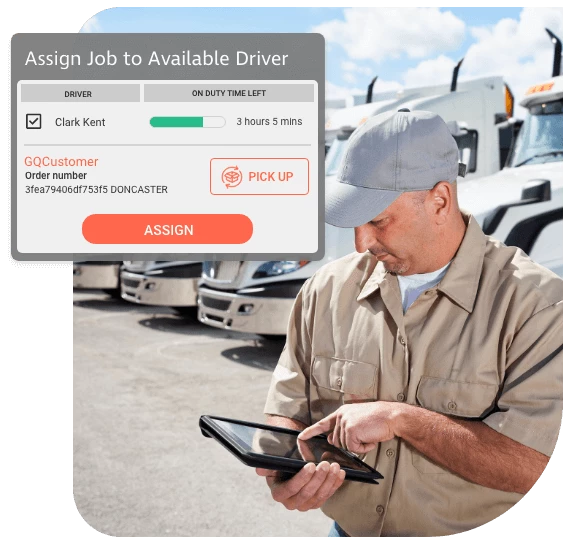

What is an ELD?
An electronic logging device (ELD) is an application that runs on a mobile device or dedicated tabled that records data regarding the operation of a vehicle, as well as driver activity including driver hours of service (HOS) and record of duty status (RODS).
The applications provide an accurate and simple means of keeping HOS records that drivers and fleet operators are required by law to maintain, with the more advanced solutions providing wider fleet management functions including:
- Driver Safety Monitoring
- Fleet Maintenance Scheduling
- Dispatch Management Programs
- Fuel Tax Management
- Emissions Reporting
Why are businesses investing in ELD solutions?
The United States Federal Motor Carrier Safety Administration (FMCSA) specifies that ELD use is mandatory for many commercial vehicles, but businesses investing in the right ELD solution are realizing benefits beyond FMCSA compliance.
By choosing an ELD solution that is fully integrated with a telematics platform businesses can get additional value from the vehicle and driver data being captured, with many operators reporting:
- Quicker roadside inspections
- More effective job dispatch
- Improved driver safety and well-being
- Stronger CSA scores
- Simplified maintenance processes
- Higher utilization rates
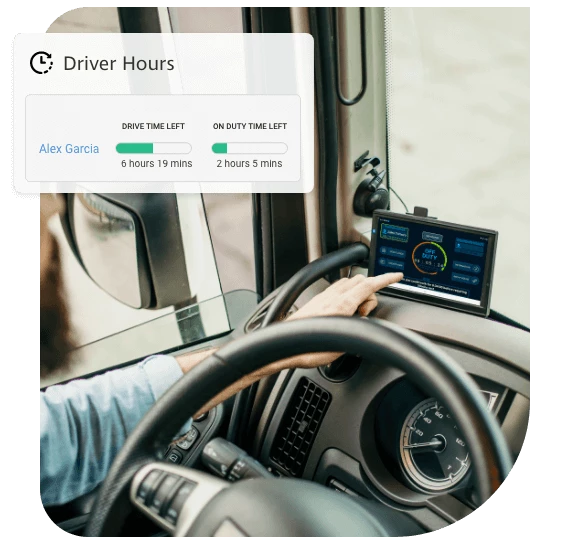

What should you look for in an ELD solution?
When selecting an ELD it is important to focus on the driver and the usability of the interface. The application should be easy to use and have simple processes to download logs and manage unassigned drive-time. Many operators want a solution that is fully integrated into their telematics platform, enabling them to:
- Improve job assignment with visibility into HOS records
- Run compliant DVIR processes
- Manage fuel tax
- Improve driver safety
- Run effective maintenance schedules
- Manage driver training and compliance
Compare ELDs
The flexibility to meet the needs of your operation
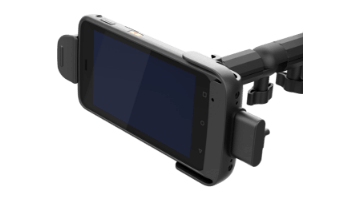
ELD Device - MT501
A small form device that can be configured to connects drivers with the TN360 apps.
Available Apps
- Electronic Logging device
- DVIR checklists
- Customizable forms
- Real-time route guidance
- Job management
- Instant messaging
- Driver identification
Physical Details
Size: Height: 6.34", Width: 3.15", Depth: 0.71"
Weight: 9.34oz
Display: 5”, 720x1280 pixels, Portrait & Landscape mode
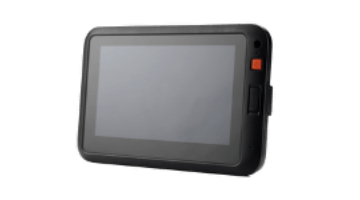
ELD Device - MT201
A rugged in-cab device that can be configured to connect drivers with the TN360 apps.
Available Apps:
- Electronic Logging Device
- DVIR checklists
- Customizable forms
- Real-time route guidance
- Job management
- Instant messaging
- Driver identification
Physical Details
Size: Height: 5.19", Width: 8.29", Depth: 0.8"
Weight: 16.9oz
Display: 7”, 600x 1024 pixels

ELD - BYOD
Use existing mobile devices to host TN360 apps, with apps available on Android and iOS.
Available Apps
- Electronic Logging Device
- DVIR checklists
- Customizable forms
- Real-time route guidance
- Job management
- Instant messaging Driver identification

ELD Software
ELD on TN360 ensures businesses stay compliant with federal regulations. By providing real-time visibility into driver hours of service, dispatchers can optimize job assignment and your fleet can run violation free. The platform also includes DVIR, IFTA reporting and detailed emissions reporting, so you can manage fleet compliance from one platform. Key software feature include:
- Driver hours dashboards
- Violation risk alerts
- Unassigned drive-time workflow
- Integrated DVIR
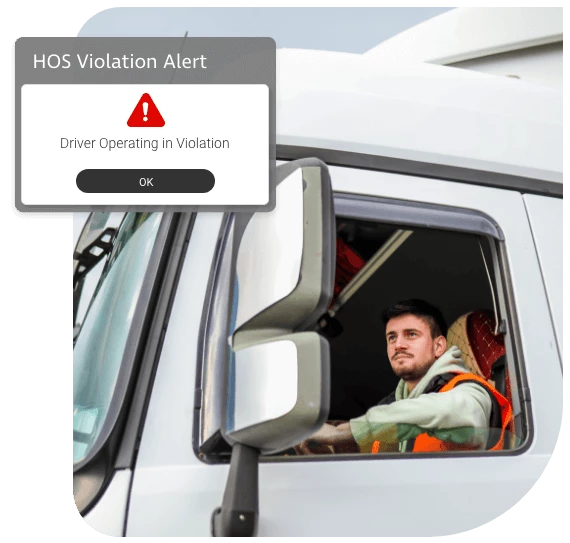

Software Features
Turn data into decisions and optimize your software
How to choose the best ELD provider?
As an essential tool for compliance and efficient fleet management, it’s important that your ELD is a good fit for your business. There are a number of ways to know when you should be considering a new solution, the main ones are:
- Increase in violations
- Significant unassigned drive time
- Poor driver feedback
- Increased delivery delays
When you start to evaluate providers there are 5 key areas to review to make sure that you're choosing a provider that can meet your needs today and in the future. These are:
- Full compliance with regulatory requirements. Can the provider provide documentation to prove their devices are compliant with the FMCSA regulations?
- Driver hours visibility. Does the software provide visibility into driver available hours to support effective dispatch?
- DVIR Integration. Does the ELD integrate with an inspection application to ensure that on-duty time is correctly recorded.
- Usability and Support. Is the driver interface easy to use with an easy process to download logs and manage unassigned drive-time.
- Fleet Management Capability. Does the ELD integrate with a wider fleet management solution that can meet your future needs?
ELD Frequently Asked Questions
We have the answers to your questions about ELD's
An ELD connects to the vehicle’s engine and automatically records driving activity and updates driver logs, giving dispatchers and drivers real time visibility into available hours and violation risks.
The HOS information is automatically recorded in the fleet management software where managers and office personnel can review HOS statuses, run reports and create compliant routes. HOS data is also displayed on the tablet in the cab, so that the driver can refer to it at any time or present it at a roadside inspection.
ELD Devices capture and transmit a wide range of data points to make sure that businesses are accurately recording hours of service and maximizing available driver hours.
Drivers and fleet managers have used different methods to record vehicle and driver hours of service information. At first this was a paper logbook with handwritten entries that evolved into an Automatic On Board Recording Device, or AOBRD. These are automated systems but do not perform all the functions of an ELD as specified in the technical requirements of the ELD mandate. Some drivers record their hours of service using a personal device - generally a mobile phone or laptop - together with an app that stores and sends this information, these processes also don’t meet the technical requirements of an ELD.
The ELD mandate, or ELD Final Rule, is a U.S. federal government regulation specifying that operators of commercial motor vehicles covered by this law will be required to use electronic logging devices, or ELDs.
These devices are designed to record data related to operation of the vehicle and to driver activity. The driver information mainly concerns hours of service, or HOS. Commercial truckers are restricted to a maximum number of hours they are allowed to drive between rest periods. HOS is a permanent record of driving hours, on-duty hours (when drivers are working but not driving) and rest time, over the course of a trip.
The first federal law that required commercial drivers in the U.S. to keep these service records was passed in 1937. Paper log books were originally used, with the information entered by writing.
The ELD mandate requires replacing paper logs and an earlier type of recorder called an Automatic On-Board Recording Device (AOBRD) with automated ELD technology.
There are many advantages of having electronic logging devices. One of the primary motives for mandating ELDs is to promote highway safety. Using ELDs ensures that drivers are taking mandatory breaks, monitoring total driving mileage and being alerted to unsafe driver behavior and/or equipment maintenance upkeep.
Using ELDs for your business can help boost profitability. They can reliably cut day-to-day administrative costs, prevent catastrophic accidents and crippling HOS violation-related fines.
It is recommended that businesses undertake a thorough evaluation of potential ELD solutions that should include the following:
Return on investment
Use an ROI calculator to weigh cost against the savings and increased productivity you can gain with different ELDs.
Integrated fleet management
You need an ELD to meet the HOS regulations, but some providers offer integrated fleet management software with features such as vehicle monitoring, two-way communication, improved routing and more.
Integrated system vs. third-party solutions
A cobbled-together system with hardware and software from different manufacturers presents an increased risk of failure at any time.
Scalability
To accommodate your fleet’s present size and potential future growth, the best solution will have the flexibility for scaling up or down. Scalability should include the capacity to add features or manage additional information if your business needs change. For example, if your market expands geographically or extends to a new industry segment.
Upfront expenses
Consider an ELD provider that offers a low-cost or no-cost equipment installation. The possible savings may surprise you.
Support
Compare the degree of ongoing support available. Some vendors won’t have a reliable or adequate customer support infrastructure.
These areas are a good starting point for your selection process. A more detailed checklist is available to help you develop a targeted search.
Self-certification
The FMCSA registered ELD list was compiled using product names the agency received from ELD manufacturers. These companies assert that their products meet the general technical requirements for an ELD to qualify as registered.
Registration parameters
For an ELD to be considered registered, it must be able to perform as specified in regard to the information the unit must record, the required recording intervals, the method this information is displayed, how it is communicated to a receiving device, and more.
FMCSA registration guidelines are based only on whether the unit is capable of these functions. There is no provision for rating the level of performance.
When a new technology, system or procedure is introduced, there’s a natural tendency for those who have never used it to feel apprehensive.
Many drivers who are current ELD users say that they felt the same way at first but now assert they would never wish to return to the old record-keeping methods. ELDs have made their jobs so much easier that turning back the clock is unimaginable.
Some benefits are:
- Less paperwork
- Fewer errors
- Helps driver manage duty hours
- Career builder
Basically, everyone who currently uses a paper log or AOBRD will need to replace that system with an ELD. This includes:
- Interstate CMV drivers currently required to keep RODS (record of duty status)
- Vehicles that weigh more than 10,001 pounds
- Vehicles with placarded hazmat loads
- Vehicles carrying more than 8 or 15 passengers (depending on vehicle class)
There are a few exemptions. They are:
- Drivers who operate within a 100-air-mile radius, who may continue to use timecards
- Non-CDL freight drivers who operate within a 150-air-mile radius
- “Drive away, tow away” operators
- Vehicles manufactured before model year 2000
- Recordkeeping with paper RODS is permitted for no more than eight days within any 30-day period.
An ELD is a recording and transmitting device. It does not control the vehicle systems. The driver remains in charge.
Event data recording comprises:
- Engine power-up and shutdown
- Driver login/logout
- Duty status changes
- Personal use or yard moves
- Certification of driver’s daily record
- 60-minute intervals when the vehicle is in motion
- Malfunctions, diagnostic events
The device records and transmits the following:
- Date
- Time
- Geographic location
- Engine hours
- Vehicle miles
- Driver or authenticated user identification
- Vehicle identification
- Motor carrier identification
Drivers and selected support personnel are able to augment the record with information such as:
- Annotations (explaining or expanding on a data point), when applicable
- Location description, when prompted by the ELD
- CMV power unit number
- Trailer number(s), if applicable
- Shipping document number, if applicable
- Built-in safeguards prevent falsifying these files. Edits are tracked and have to be approved by the driver.
Commercial vehicle operators are already required to keep records of duty status. ELDs are not changing that; they’re merely a more effective means of capturing the same information.
Records maintained by ELD offer significant advantages to the company and the driver. Compared to paper HOS sheets, ELD recordkeeping:
- Saves time
- Saves money
- Improves safety
- Promotes efficiency
- Reduces errors
- Reduces effort
The Federal Motor Carrier Safety Administration maintains a list of ELD products from various manufacturers. These products were submitted by these companies with a statement that the device meets the minimum operational requirements specified by the agency.
The products have not been formally evaluated or tested by FMCSA.

